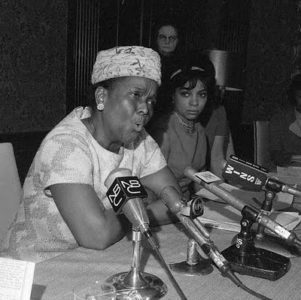Black History Month: 5 Influential Black Americans

February 26, 2019
Black History Month, officially accepted as February since 1976, is a time designated to remembering and celebrating the lives, achievements, and impact of prominent figures in the black community. President Gerald Ford recognized the month first, stating that Americans should “seize the opportunity to honor the too-often neglected accomplishments of black Americans in every area of endeavor throughout our history.” In that tradition, the following are five influential black leaders.
Martin Luther King Jr.
Martin Luther King Jr. is one of the most well-known civil rights activists: he lead the movement, co-founded the Southern Christian Leadership Conference, and participated in the Montgomery Bus Boycott and the March on Washington for Jobs and Freedom. He believed in using nonviolent protest methods to further the fight for equality. Although imprisoned almost thirty times for acts of civil disobedience, his work towards a better future did not go unrecognized. In 1964, he became the youngest person to receive the Nobel Peace Prize. He was also awarded the Congressional Gold Medal as well as the Presidential Medal of Freedom.
Maya Angelou
Maya Angelou, poet and civil rights activist, overcame a lifetime of struggle and abuse to become the influential and powerful woman she was. She spent nearly five years silent due to the trauma, spending her time memorizing Shakespeare’s sonnets. She used literature to help heal. She grew into an honest and outspoken person, unashamed to speak about her experiences. She joined the Harlem Writers Guild and continued to be recognized for her greatness through awards and honors from 1970 up until 2015 when a US stamp was issued in her memory after she died. She had also served as the northern coordinator for Martin Luther King Jr.’s Southern Christian Leadership Conference, and worked with Malcolm X to establish the Organization for Afro-American Unity.
Ella Baker
Ella Baker’s passion for civil rights was ignited at a young age when she heard her grandmother’s story about being whipped by a slave owner for refusing to marry the man he’d chosen for her. She became a NAACP secretary in the 1940’s, and then in 1957, helped Martin Luther King Jr. start the Southern Christian Leadership Conference. Throughout her time as a dedicated civil rights activist, she raised money for the Montgomery Bus Boycott and organized the sit-in movement. In May 1985, she was awarded a doctorate of letters from the City College of New York.
Malcolm X
Malcolm X was a civil rights leader and spokesperson for black pride. He converted to Islam while serving time in prison for burglary, and after his release, became a minister at the Nation of Islam temples in Boston, New York, and Philadelphia. He founded the Nation of Islam newspaper Muhammad Speaks in 1957. Through this newspaper he was able to spread his messages of black pride and black power. At the start of his career in activism, he preached that violence was necessary to bring about equality, however in 1964 he began to speak of more of peaceful resistance and unity.
Sojourner Truth
Sojourner Truth escaped from slavery and used her newfound freedom to speak out for abolition and women’s rights. She became a well-known activist after giving a speech at the Ohio Women’s Rights Convention in 1851. She often spoke out against other abolitionists for not focusing on equality for women as well. After her memoir The Narrative of Sojourner Truth: A Northern Slave was published in 1850, she started touring and speaking to increasingly large crowds.

